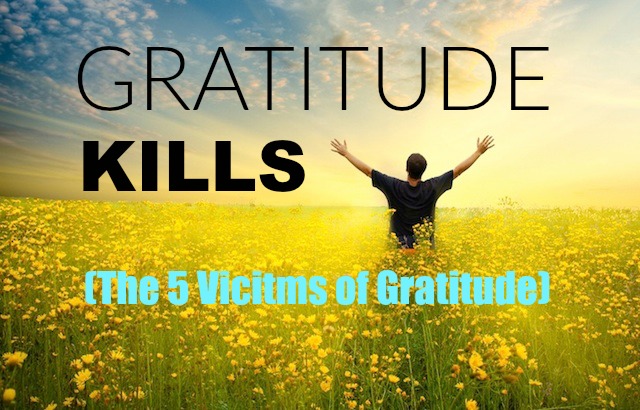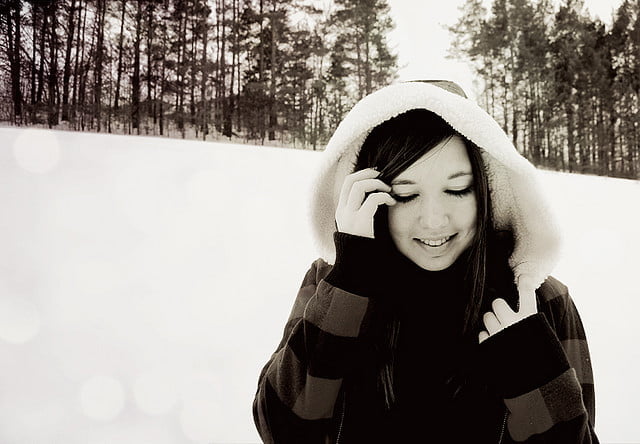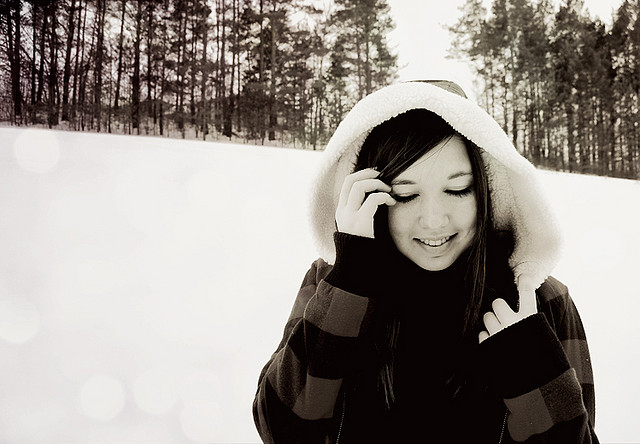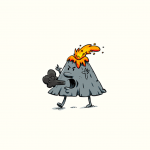Feng Fu Point – The Ultimate Ice Therapy

Have you ever wondered if there is some secret thing you can do that puts you on another level in life? Something that increases your energy, enhances the quality of your sleep, relieves pain and reduces symptoms of certain diseases?
Well, I’m about to share that secret with you!
It’s called Feng Fu.
Feng Fu is common in Chinese acupuncture and it involves placing an ice cube on a specific position on the back of your neck for twenty minutes.
The Feng Fu point is a pressure point found at the base of the skull, just below the bottom ridge of the skull cap at the top of the neck. Stimulating the fengu fu point with an ice cube once or twice a day will promote overall health and wellbeing and make you feel like a rockstar!
Benefits of the Feng Fu Point Ice Therapy
There are a number of reported benefits to Feng Fu ice therapy. According to Chinese traditional medicine, this therapy rejuvenates the entire body and by bringing it back to its natural physiological balance. Pretty cool, right?
When you place an ice cube on the Feng Fu point as outlined above (and do it consistently each day), it can benefit you in the following ways:
- Reduce headaches, joint pain and tooth ache
- Reduce and eliminate the effects of a cold
- Improve your sleep quality
- Improve your overall cardiovascular system
- Improve your digestive system
- Reduce the symptoms of asthma
- Reduce the symptoms of arthritis, hypertension and hypotension
- Cure sexually transmitted diseases
- Manage neurological disorders and spinal degeneration
- Manage thyroid disorders
- Manage impotence, infertifily and menstrual disorders
- Manage obesity, manlnutrition and gastronintestinal tract
- Manage stress, chronic fatigue, insomnia and depression
With a list this good, why wouldn’t you give it a try?!
How to Find the Feng Fu Point
- While lying down (or with your head leaning forward), use your hands to touch the back of your neck
- Feel the point where the bottom of your skull meets your neck.
- You should be able to feel an “indent” in your neck between your two neck muscles as shown in the diagram below

- If you’re having trouble finding it, try tilt your head back so you can feel your neck muscles better. In the middle of them you will find the depth of the Feng Fu point.
How to do the Feng Fu Ice Cube Method for Healing
Doing the Feng Fu ice therapy on yourself is incredibly easy. All you need to do is follow the 4 simple steps below:
- Lie flat on your stomach and make yourself comfortable
- Place an ice cube directly on the Feng Fu point at the back of your neck
- Leave the ice cube on the Feng Fu point for 20 minutes
- Feel the benefits!
If you are not in a place to lie down then sitting is fine too. You can secure the ice cube by using a bandage, scarf or other material on your hand.
For maximum benefit, professional acupuncturists recommend doing the treatment twice a day – first thing in the morning and last thing at night.
When you first apply the ice cube, you may feel the strong cold sensation pass through your body and you might find it uncomfortable. Hang in there! Withing 30 to 40 seconds or so you should feel the heat go straight to the Feng Fu point.
In the first few days of putting ice on your Feng Fu point you may experience some euphoria due to the release of endorphins into your bloodstream.
My Experience
I have been placing an ice cube on my Feng Fu point once a day for the past week and I definitely feel benefits. I find it similar to meditation… it’s just so nice to lie down, have some ice on your neck (particularly in Summer) and feel your body be taken to another place. I have an overall general sense of greater wellbeing.
Placebo?
Who knows… but placebo or not, it’s works! So I’m going to keep doing it.
Note: Therapists recommend that if you are pregnant, have a pacemaker or suffer from schizophrenia or epilepsy to NOT do this method. Why? I’m not sure.. but speak with your local acupuncturist and they will probably be able to tell you 
Your Thoughts?
Try it out! I’d love to hear your thoughts…
What do you experience?
Do you feel any of the benefits above?
Please share your experience by leaving a comment below and if you feel this method can help someone, please share it with them.
Brendan
The post Feng Fu Point – The Ultimate Ice Therapy appeared first on The Start of Happiness.
Happiness: Detangled, Dissected and Defined
“Happiness is whatever you want it to be.” ~Scrooge in Scrooge: The Musical
It seems there are about as many definitions of happiness as there are people who spend any time talking about it.
But some of the definitions leave us wondering whether we would even recognize the thing if it were to hit us between the eyes in broad daylight.
Competing Definitions
Wikipedia partly defines it this way: “Happiness is a mental or emotional state of well-being characterized by positive or pleasant emotions ranging from contentment to intense joy”.
Sigmund Freud’s definition of happiness was centered in the Pleasure Principle, that satisfying needs, and thereby experiencing the pleasure gained by their satisfaction, is the highest form of happiness.
Aristotle claimed that happiness in the highest sense is a contemplative life.
Coca Cola has even jumped into the game by defining happiness as “anything that can bring a smile to someone’s face.” And, by the way, they remind us they have just the product to put it there!
Happiness, it seems, has become a pretty nondescript term with unclear parameters, unspecified causes that lasts for undetermined amounts of time.
The Problem with Imprecision
Of course, the problem with imprecise language is that it confuses the process of obtaining the thing the imprecise words try to describe.
It’s like giving directions by telling a lost driver to go straight for a while, turn, drive some more and turn again somewhere up there.
Not particularly helpful.
Words have meaning. But if the meaning has been diluted or is overly vague and nondescript, those wanting the thing the term represents (happiness) will likewise have a difficult time finding it.
So if the same term describes both the “pleasant emotions” we get when eating a slice of New York cheesecake and the feelings of accomplishment that living our lives with meaning and purpose generates, the term is no more meaningful than calling anything with chocolate in it a cookie.
What Happiness is Not (debunking cultural myths about happiness)
Before getting started on the definition, however, it’s helpful to first understand what happiness isn’t. When there’s too much debris in the road, a souped up engine just won’t get you where you want to go. We first have to clear the rubble.
Since there is so much misinformation taught by well-intentioned advice-givers, it’s necessary to spend some time cleaning the glass before looking through it.
1. Happiness is not the result of fame or fortune

Happiness cannot be purchased. No bank account is large enough to buy it. The only relation wealth has to happiness, in fact, is in having enough to remove the financial obstacles to it by reducing the stress of wondering how bills will be paid, food put on the table and eviction notices avoided.
Beyond that, money and happiness are only marginally connected.
The perfect house in the perfect neighborhood with the perfect kids playing on the perfect lawn may create a sense of excitement, pride or satisfaction for a time.
But those feelings are short-lived and will fade as the thrill of the perfect home are replaced with insecurities and dissatisfactions with other (mostly internal) parts of life. What was once new becomes common, no longer able to mask the internal conditions of the heart.
Besides, happiness is a much more tenacious thing that sticks to the deepest parts of our lives and is independent of most circumstances, conditions and experiences. Wealth can provide a shiny polish to happiness, but can’t plant the substance of it in the heart when it has not yet grown there by other means.
2. Happiness is not the same as fun or pleasure

Happiness should not be confused with the circumstantial sensations of pleasure or excitement, fun or even enjoyment. Certainly happy people experience all such feelings, and feel them more purely and frequently (since more of life is fun and enjoyable to happy people). But such things don’t define happiness.
Fun and pleasure come and go as fleetingly as the activities that produce them. But happiness is long-lasting, a condition of the soul, the foundation on which the circumstances of life are experienced, endured, or enjoyed.
Now we’re closer to a definition of happiness, but not quite there yet. Knowing the ingredients in a cake does not fully tell us what a cake is. But knowing the ingredients helps us understand what’s beneath the frosting. Similarly, while the ingredients to happiness are not its definition, it gets us closer to one.
3. Happiness is not having everything you want

Happy people tend to be those who take pleasure in simple things. They are easily pleased and are grateful for even the smallest blessings. They appreciate what the unhappy may find annoying or offensive.
It’s not so much what you have that makes you happy, but how much you appreciate what you have, no matter how much or little it is.
If happiness was a reflection of having everything you wanted, Hollywood and the music industry would be peopled with the happiest people in the world. But just a glance at the tabloids will tell you that’s not the case.
What Happiness Consists of (a 3-part description)
Just as a description of a crime suspect can help police identify a thief, knowing the characteristics of happiness likewise helps us get closer to our definition.
1. Happiness is a state of being
Happiness is a quality of life more than a particular emotional response to a particular event or set of circumstances. It is the condition of who we are and how we think and what we believe and how we live.
As such, happiness is not necessarily the result of getting everything we want or having everything go our way. As a matter of fact, there are plenty of happy people who are going through some very challenging times in their lives.
This is only possible when we realize that happiness is something we take with us into life rather than something that happens to us by life. Happiness is not, therefore, a fleeting shadow, but a predictable characteristic of the way we live. It’s the difference between feeling happy and being happy. One describes a moment. The other describes a person, a state of being.
In short, happiness is what happens quite naturally when who we are and how we think are fundamentally in harmony with the principles that create it. Happiness is not so capricious as to come and go without rhyme or reason. It lingers, the constant that underlies (and reveals!) the quality of our thoughts, attitudes, presuppositions, interpretations, perspective, actions and character.
2. Happiness is not a one-size-fits-all proposition
Happy people are not necessarily those who laugh the loudest. They are not always the most active. Or those who live the most adventurous lives or have the most FB friends.
Happiness is experienced differently by different people. We all have a wide range of different tastes, predilections, personalities and natural emotional set-points that influence how happiness will be uniquely experienced.
Some people are more sedate and calm in their personality. That doesn’t necessarily mean they are less happy, only that they show it less effusively. They may simply express their joy in less obvious or flamboyant ways, characterized more by contentment, peace and soul-satisfaction than gut-busting laughter and heart-pounding excitement or effusive, gregarious engagement.
The bottom line is that happiness should be defined less by the way it’s expressed, as by the qualities that produce it and the duration or regularity with which it is experienced and by the internal climate our thoughts, beliefs and attitudes produce.
3. Happiness is the sustained natural condition of living life well
Happiness is the result of the thoughts we have come to habitually think, the attitudes we harbor, the beliefs we’ve consciously and unconsciously accepted as true about the world, life, others, ourselves, what we expect from life and others, and how we interpret what we experience with others.
It is also influenced by the person we are and are becoming, our character and values and conscience. When these elements are in harmony, happiness becomes the natural byproduct of that kind of life.
(These character traits are at the basis of a happy life. Click over to see how you measure up! Which ones are you lacking? Which are your strongest qualities?)
Happiness Defined
So where are we now after spending about 1,500 words on the subject to this point? Well, my first goal was to clear the debris of false impressions and misguided definitions to happiness. The next was to set some happiness parameters, or identify some of the qualifying characteristics of a happy life.
Still, I need a definition, right?
So here it goes: Happiness is the emotional state (whether relatively sedate or effusive) that lifts and inspires, expands and extends life and the joy of living. It is the underlying state of inner peace, optimism and gratitude that extends itself in love and confidence and is reflected in a decent life of purpose and meaning. Happiness is the state of feeling good about the track you’re on, the direction you’re pointed and the quality of life you’re living.
I trust my definition will never make it into Merriam-Webster. But it’s still a good, even if lengthy, definition.
What’s yours?
Chime in!
What parts of happiness do you identify (or struggle) with? What would you add to or change in my definition? Please comment below. No, seriously. Just scroll down and leave your thoughts and experience with happiness. Go on. You know you want to…
Before you go…
LIKE our FB page to get daily inspiring reminders to live a happy life:
5 Positive Archetypes of the Divine Feminine for Sacred Self-Discovery
What do archetypes have to do with awakening your Divine Feminine and why is this important?
Also, is any talk on Divine Feminine hocus pocus and how does this apply to the modern day woman?
Well, allow me to explain why you would want to dive deeper into the topic of archetypes of the Divine Feminine for sacred self-discovery.
For a start, awakening your Divine Feminine is important because you wouldn’t want to have gender-related beliefs holding you back from drawing on your sacred womanly gifts and being the best that you can be. Beliefs that do not serve you include the following: women should be of the inferior sex, girls can only be seen and not heard, or that women are only meant to just sew or cook. You’d be surprised how many of us continue to hold such beliefs.
It’s been a struggle for many women to align with their highest potential. The Divine Feminine has been suppressed for years until recently. Women have no or little rights to speak, express or show up throughout history. Even in modern times, many women continue to live in a paradigm that is outdated and that no longer supports our growth.
Awakening your Divine Feminine is nothing mystical. Nor is it a New Age fad. After all, it’s your birthright to live as you are. In your true nature. You are able to draw on your feminine traits, strengths and gifts. It’s an awesome feeling, being in the space where you own yourself fully.
For a long time, I had found it difficult to speak, express or show up confidently. It was only when I dug deep that I realised how I had bought into beliefs that disempower women. These beliefs were embedded into my psyche and affected the choices and decisions I made. The self-realisation hit hard and it was painful before I could free myself from the layers of falsehood.
Having helped other women through my coaching and healing services, I became aware of the vast and negative consequences of not reclaiming our Divine Feminine. They include the following:
– Low confidence and poor self-esteem
– The subject of emotional and physical abuse
– Depression
– Inability to shine at work
– Slower progress in job promotion
– Unable to go for what we desire and so on.
Conversely, when you live in fullness of your Divine Feminine, you are able to lead confidently from power. Living in fullness means having to reclaim parts that you have abandoned or ignored. It starts with self-discovery. Self-discovery offers you the opportunity to set the conscious intent of breaking free from the limitations you have imposed on yourself just because you are female.
I recommend incorporating an exploration into archetypal patterns so that you can reclaim your Divine Feminine. Go through each pattern in turn and align with the positive attributes. You can begin your self-discovery journey by journaling on archetypes with this guide here!
What is the Meaning of Archetype?
According to Jungian psychology, an archetype is a collectively-inherited unconscious idea, pattern of thought, image, etc., that is universally present, in individual psyches.
The 5 Archetypes of the Divine Feminine

(1) Creator or Earth Mother
The Creator Mother within the soul of a Divine Feminine is like Earth. She has maternal instincts which makes her very caring. As a Mother, she nourishes with milk and she sustains life. Through her womb, a mother allows the merging of the masculine and feminine energy for creation to happen. She is akin to a Midwife, facilitating birth.
(2) Sensual Lover
Sensuality is the ability to fully experience the senses, without apology or restraint. The sense of smell, taste, touch, and vision combine to awaken her body. She is also a Sensual Lover who unites her energy with her masculine partner as ONE.
(3) Sacred Healer
The Divine Feminine is a Sacred Healer, whose loving and caring nature helps to heal relationships. She heals through her heart and soul. Her innate nature is full of grace. She is connected to water for emotional management.
(4) Wise Sage
The Divine Feminine is a Wise Sage, using her intuition to guide her for decision making and for navigating life. She senses energy, whether consciously or unconsciously, and is able to tell if something feels off or not right.
(5) Leader or the Warrioress
In a state of balance, the Divine Feminine is calm and therefore, not a chronic worrier but a Warrioress. As a Warriorress, she is able to handle her multiple responsibilities, deal with challenges and gets things done. She holds things together for her family and loved ones of whom she fiercely protects.
The Divine Feminine leads with creative power. It does not necessarily mean that she needs to be artistic. Her nature allows her to be receptive and to be open to ideas. Thus, she is able to work on the ideas for problem solving or for creating her best work.
Her gifts help her to carve out unique work for herself. Thus, she does not need to be in a co-dependent relationship. Most certainly, the modern woman does not have to rely on her partner to create a source of living. She has what it takes to succeed. Success is hers when she deems herself worthy.
Drawing on Your Positive Archetypal Traits
“We will discover the nature of our particular genius when we stop trying to conform to our own or to other people’s models, learn to be ourselves, and allow our natural channel to open.” Shakti Gawain
Connecting with your Divine Feminine requires you to be courageous to own who you are. There is no need for you to conform to the standards held by any masculine-led community. On the contrary, you are ready to overcome any fear of rejection.
“I was once afraid of people saying “Who does
she think she is? Now I have the courage to stand and say, “This is who I am.”
Oprah Winfrey
The more you know yourself, the more you are able to peel off the layers of falsehood. You realise that you have been living in an illusion and you no longer wish to do so. As you become more authentic to your true nature, you’d find it easier to shine your core brilliance. In my book Self-Discovery Journal for Women, I provided writing prompts so that you can reclaim yourself.
Align with the Positive Archetypes of the Divine Feminine NOW
There is a cost to waiting if you are not seeing the urgency in awakening your Divine Feminine. The earlier you reclaim and celebrate yourself, the easier it would be to step into the best that you can be. You will be free of any beliefs that erodes your confidence as a woman.

“The Divine Feminine understands that even as her body ages, she does not need to resort to invasive procedures to keep her youth or be worried that she has now lines to show. Nor does she need to fear losing her man because she is older. She has enough self-confidence to know that she is still beautiful from the inside-out.” Self-Discovery Journal for Women: 250 Questions and Writing Prompts to Awaken Your Divine Feminine
I’ve personally seen how women were able to shine quickly after achieving a breakthrough from reclaiming lost parts of themselves. My clients had reported improved well-being and better success rates as soon as we work together. When they finally own who they are, their life magically changes!
It can happen for you too. Your feminine gifts are presented to you at the soul. Claim who you are NOW!
May you lead your best life, in full awareness of your divinity and true nature!
Love and abundance always,
Evelyn Lim
Life Coach for Women Entrepreneurs
Resources:
1. Self-Discovery Journal for Women: 250 Quhestions and Writing Prompts to Awaken Your Divine Feminine
2. Get an akashic soul reading for sacred self-discovery here!
3. Apply for a clarity call to get from stuck to breakthrough.
P.S. Enjoyed this article? Feel free to share it on social media. Thank you in advance.
P.S.S. Share your thoughts and comments below 
The post 5 Positive Archetypes of the Divine Feminine for Sacred Self-Discovery appeared first on Abundance Life Coach for Women | Evelyn Lim.
7 Ways to Stop Feeling so Lonely

“Loneliness and the feeling of being unwanted is the most terrible poverty.” ~Mother Teresa
EDITORS NOTE: The following is a guest post written by Nelu Mbingu.
If you are lonely, then you need to know that you are definitely not alone.
Our world is more connected than ever before thanks to technology. We have more ways of interacting with people than we know how to use well.
Yet, more and more of us find ourselves having to endure the quiet pain of loneliness.
According to the Huffington Post, loneliness might be one of the biggest public health concerns of this age and it is actually linked to an increased chance of mortality.
Indeed, it is becoming increasingly important that we all learn how to deal with this painful feeling.
7 Ways to Put a Stop to Loneliness
1. Be determined to actively end your loneliness
It’s sometimes easy to feel powerless when it comes to loneliness, and we often end up passively waiting for someone else to make us feel less lonely. You may feel that your loneliness indicates that nobody is willing to connect with you and there is nothing you can do about.
But that is far from the truth. Ending loneliness and becoming connected to your world is something that you can and should pursue actively. You need to make a decision to consciously work towards becoming less lonely.
2. Identify reasons why you are lonely
We all feel lonely for different reasons. Some of us have no one to interact with on a consistent basis and that’s why we feel lonely. And some of us are constantly surrounded by people but we don’t feel connected to them so loneliness lingers in our hearts.
You may feel that the people in your life don’t share your thoughts and ideas, or that they don’t understand you. You may be lonely because you feel that nobody cares about your specific needs and desires.
Whatever the reason, you need to identify it so you know exactly how to handle your loneliness and what to focus your attention as you work to improve that part of your life.
3. Be interested in people
Start to cultivate an interest in the people around you and they may reciprocate that interest. When you talk to people, be fully present in the conversation, try to listen and understand the other person’s thoughts and ideas.
Forget your own fear that people are not interested in you and be fully present in the moment at each one of your interactions with other people.
Even if the level of interest is not reciprocated, you will walk away feeling more satisfied with the interaction, because you will have connected with another human being.
4. Take Initiative in your existing relationships
You don’t always have to wait for somebody else to invite you somewhere. You can be the one that initiates the dinner or the movie plans. Try to create situations in which you can spend quality time with the people already in your life so you enhance your closeness with them.
In other words, work with what you already have.
5. Be open about your thoughts, ideas, and desires
People who are chronically lonely tend to fall into destructive mental habits and one of them is being overly withdrawn. They try to avoid the pain of not being understood and being disconnected by not giving people an opportunity to understand and connect with them.
It’s an ironic situation where you desire connection but you’re also unconsciously preventing it from happening by not reaching out and communicating with others.
So the solution is to share your thoughts and feelings with others and to do so openly and fearlessly. Make people understand you instead of passively waiting for them to do so.
6. Be a pleasant presence
When you engage with others, try your best to be as positive as you can and to make people enjoy your company. Don’t be overly critical and judgmental, but try to be vibrant and open instead.
If people enjoy your company, they will seek it more often, so by being a pleasant presence, you set the foundation for long, enduring relationships.
7. Find people who share your interests
Whether it’s coin collecting or video games, everybody is interested in something. And just as there are many interests, there are many people who share those interests. Find what interests you and connect with others on that basis.
Luckily, with the internet available to us, the search will be much easier for you.
Final Thoughts
Ultimately, relationships are everything. The people in your life matter more than wealth and success. Don’t hesitate to work on your relationships and your connection with others if you feel they need work. Loneliness is a painful feeling.
But like any pain, the earlier you take steps to correct the cause, the earlier you will be able to replace the gray fog of loneliness with the bright sunlight of happiness.
_____________________________________________________
Nelu Mbingu is a self-improvement blogger, the founder of Lessons From Everyday Life. She writes thought-provoking articles on a variety of topics relating to personal growth and social success. Visit her blog and follow her on Facebook and Twitter.
5 Steps To Effectively Resolve Family Conflicts And Tensions

The post 5 Steps To Effectively Resolve Family Conflicts And Tensions appeared first on NotSalmon.
Are you fighting with family members? If so, here are tools to resolve family conflicts and reach some form of compromise, understanding and peace. Read on.. It’s normal to have disagreements with family members. But sometimes conflicts can turn into […]
The post 5 Steps To Effectively Resolve Family Conflicts And Tensions appeared first on NotSalmon.
8 Advantages of Being an Introvert at Work
Historically, the term ‘introvert’ has been considered as being largely negative. Introverts are often the victims of fundamental misunderstandings, however, as others confuse them as being shy, overly analytical and in some instances entirely bereft of empathy for others.
Not only are these perceptions false, but they also disguise the fact that being an introvert offers many potential advantages. This is particularly true in the workplace, where many introverted character traits lend themselves to being a more responsive and effective employee.

8 Advantages of Being an Introvert at Work
So what exactly are the major advantages of being an introvert at work, and how can you capitalise? Let’s explore this further:
1. Introverts are Great Listeners
One of the core strengths of an introvert is their innate ability to listen, and there are several reasons for this. To begin with, introverts are more comfortable listening than holding court within a conversation, while they are also more thoughtful about what they say and often use the responses of their conversational partners to influence their input.
This can highly beneficial in the workplace, as introverts have an opportunity to absorb knowledge and insight from those around them in a bid to progress their careers. This is in stark contrast with extroverts, who often use professional conversations as a stage to promote themselves without listening to what is expected of them.
To make the most of this opportunity, be particularly attentive to your colleagues and those in positions of seniority. Above all, make sure that you process any information that can help you perform better as an employee and identify opportunities for growth.
2. Introverts Can Be Relied Upon by Leaders
On a similar note, listening is a skill that helps to build trust and respect within the workplace. This is why even charismatic, extroverted leaders tend to recruit introverts in position of power, as they can be trusted to listen attentively to concise instructions and implement these with a minimum of fuss.
While I have seen numerous individuals with introverted personalities attain promotions at work, it is still important to use your initiative where possible within your role. This will help you to take further steps into leadership while and build your confidence as an employee.
3. Introverts Make for Thoughtful and Open-minded Leaders
One of the main perceptions surrounding introverts is that they do not make good leaders. This is largely untrue, however, as while those with an introverted persona may lack charisma they are thoughtful and open-minded when developing strategies, considering innovative ideas and recruiting staff members.
The latter point is particularly important, as extroverts can be insecure and competitive in their nature and this may cause friction with certain, successful members of staff. You must therefore take steps to show your open-mindedness and thoughtfulness in the workplace, while also avoiding any conflict or petty competition with colleagues.
4. Introverts are Empathetic Employees
As a general rule, introverts boast an extremely high level of self-awareness and are extremely sensitive to the needs of those around them. This is an unusual philosophy in the workplace, where so many are preoccupied with their own issues and the desire to progress their careers.
Introverts can capitalise on this, however, simply by being themselves and showing consideration for colleagues, teammates and employers. This will help you to stand out as an individual, especially if you are willing to be flexible in your role when pressure is created by long-term absences and sickness.
5. Introverts Tend to Have a Better Work-life Balance
If there is one lesson I have learned from work, it is that the daily interaction with colleagues and employers can be extremely draining for anyone with an introverted personality. This is something that introverts are conscious of at all times, meaning that they have an innate appreciation of the need for a positive work-life balance that can empower their personal lives.
With recent research suggesting that jobs paying an annual salary of £37,000 per annum tend to serve a tipping point in terms of the balance between sacrifice and reward in the workplace, having an appreciation of your limitations can help you to improve your life no end. Over time, this will make you a superior colleague without impacting negatively on your recreational time outside of work.
6. Introverts are Self-reflective and Excellent at Error Correction
We have already touched on the fact that introverts are excellent listeners, and this means that they are able to take on considerable feedback regarding their performance at work. Not only this, but those who are introverted also have a self-reflective mind-set that enables them to process this information and turn into action steps for their own, personal development.
Such a philosophy also allows introverts to excel when correcting their own errors, as they take their mistakes seriously once they have been highlighted and commit themselves to reverse these openly. When you consider that making mistakes is an inescapable element of being human, your natural outlook as an introvert offers you an advantage as a conscientious and thoughtful being with great integrity.
7. Introverts Enjoy More In-depth and Meaningful Proffesional Connections
We live in the digital age, where professional networks are driven by real-time chats and single line introductions. While this enables extroverts to build vast and often vacuous networks, however, it is well known that introverts crave the kind of in-depth and meaningful connection that drives genuine understanding.
This can actually be beneficial to introverts in the contemporary workplace, where intimate relationships based on knowledge and trust stand out while driving greater levels of collaboration. You can also your need for in-depth connections to build rapport with colleagues and clients alike, strengthening your position within the firm while also contributing to increased revenues.
8. Introverts Make Considered Rather Than Impulsive Decisions
Whether you are a leader or not, you will most likely have to make decisions in your professional life. While introverts are often criticised for over-analysing decisions to the point where they suffer a paralysis of thought, this is a gross exaggeration that disguises the benefits of forming well thought-out and informed decisions that have been considered from multiple angles.
In fact, the capacity of introverts to give due consideration to every aspect of a decision can benefit businesses greater, as it helps to avoid the type of impulsive mistake that can destroy even established ventures. From your own perspective as an introvert, you should therefore stay true to your inner thought processes when making a decision and resist the suggestions of those who want you to act quicker.
These are just some of the many benefits of being an introvert in the workplace, while these examples can help you to develop your career ahead of those with greater charisma and charm. If you would like to suggest any ideas that we have missed, feel free to leave your comments below!
The post 8 Advantages of Being an Introvert at Work appeared first on The Start of Happiness.
Gratitude Kills!

“Gratitude changes us. It takes no prisoners, offers no mercy, and gives no ground. Gratitude is a revolution and a civil war, an unrepentant killer of the most miserable parts of our nature.” ~M2bH
Just as there are silent killers attacking your body this very moment (toxins, free radicals, germs, viruses), there are moral and psychological killers attacking your happiness and quality of life as well. You have an immune system that prevents most of the internal enemies from wreaking much damage to your body most of the time.
There is a powerful emotional immune system, a kind of psychological antibiotic that can destroy the emotional viruses that sicken your soul and well-being, robbing you of confidence, peace and happiness too.
In fact, it is the single most effective killer of unhappiness. It will change the way you see the world, the way you interact with others and how you enjoy the depths of happiness that are available to those possessed of this killer of emotional toxins.
This life-enhancing, happiness-inducing miracle drug that does, in fact, ruthlessly kill its enemies—you’ve guessed it—is gratitude.
But What, Exactly, Does Gratitude Kill?
1. Gratitude Kills Regret
Regret is the loss we feel at having done something we should have avoided or at failing to do what we shouldn’t have avoided.
And it gnaws at us if we let it.
Gratitude, on the other hand, destroys regret by nullifying the loss at its core. With gratitude (the habitual way of thinking and being, not merely the expression), there is little room for regret because we appreciate the good that comes from the paths not travelled as well as the paths ill-advisably ventured.
Regret becomes meaningless because we are truly thankful for the growth that our mistakes pushed us into, for the lessons taught and the insights acquired, and wisdom deepened by our stumbles and face-plants. We recognize we are who we are today in part because of the missteps we’ve taken in the past.
2. Gratitude Kills Disappointment
Disappointment is the feeling we have when things don’t work out the way we wanted them to, when reality falls short of our expectations. Life just didn’t go our way. Our marriage crashed or our education was misspent or our career never took off as expected.
Gratitude kills disappointment because we are sincerely grateful for what we have. Grateful people don’t stare into the abyss of missed opportunities or unsatisfying lives. Grateful people love what they do have and so they cherish whatever life became and feel privileged just to be able to open their eyes one more day.
For the grateful, there is no room for disappointment; Each moment offers life. And the grateful are thankful for both the tiniest and largest things most people seem usually to take for granted. Things could be so much worse than they are right now.
Gratitude turns disappointment into lessons learned, discoveries made, alternatives explored, and new plans set in motion. Why feel bitter that things are not one way when you can be grateful they are at least as good as they are and that you now have the opportunity to change them, set new courses and trajectories?
But keep in mind what I’m not saying. I’m not suggesting grateful people ignore reality, or simply suck it up, or pretend things are better than they are. They literally and actually feel good about what they have even if ingrates seem only to notice what everyone else has.
3. Gratitude Kills Boredom
Boredom is the absence of motivation or inspiration or ambition or interest. It is the quality of the bored person, not the quality of the circumstance the person finds boring.
Gratitude ends boredom because if your general attitude is thankfulness, then you are thankful to be where you are, surrounded by the people surrounding you, or grateful to have alone time, if that’s the case, to think and remember and plan or meditate and pray.
You are grateful for each moment as a gift from God or Life, something to cherish, to make the best of, to use and enjoy to its fullest.
Those who are truly grateful are deeply moved by the privilege of living, of waking up another day to the beauty of life’s possibilities and opportunities. They therefore make productive use of it. They get outside, do things, learn things, reach out to people, join movements and generally make the most of the lives they have been so thankfully given.
Where one may find no interest in a lecture or documentary or a poorly planned party, the grateful are in the moment, enjoying what is enjoyable, taking an active interest in what it is, even if it’s not something better.
Because the attitude of the grateful is focused on what they have (not what they don’t have, or what the occasion isn’t), they cherish each moment. They recognize life as a precious gift. And so they tend to be proactive about their circumstances.
If something doesn’t interest them, instead of complaining about it, they change it by either improving what it is, finding something in it to appreciate, or leaving to find something that does interest them.
4. Gratitude Kills Loneliness
If gratitude truly drives you, if it fills you and is the lens through which you view life, then you appreciate the opportunities given to you to enter the lives of others. It is a precious memory, a granted solemnity, a tender interaction deeply appreciated.
There is little room for loneliness because it is crowded out and pushed off the cliff of appreciation. You less likely feel bad for those not paying attention to you, and more likely feel grateful that there are people you can pay attention to.
The focus in outward, not inward. The mindset is on what you can do, not what others have neglected to do for you.
5. Gratitude Kills Unhappiness
The single greatest cause of happiness is gratitude. That’s a big statement. But just try to feel sad and grateful at the same time. You can’t do it. Like light chasing darkness out of the room, gratitude ends the life of unhappiness whenever it’s invited in.
Unhappiness is not the natural byproduct of bad life experiences. It is the natural byproduct of bad thinking about bad life experiences (or bad thinking about good life experiences).
But gratitude changes those thought patterns. Gratitude becomes the new lens, the purer lens that changes the way you interpret the world, life, all experiences you are faced with or are called to go through. You see the seed of growth in the trial, the opportunity in the challenge, the polish in life’s painful scrubbings, the meaning in what others see only as purposeless and arbitrary.
Gratitude, then, is the filler of emotional potholes, the killer that obliterates the ugliness that plagues all of our thoughts to some degree, from time to time. It destroys negativity and unhappiness and the frustration of a life that is not what you envisioned it to be.
As a matter of fact, gratitude increases the likelihood that you get off your duff and do something about creating the life you want to live in the first place.
FINAL THOUGHT
Does gratitude kill? Absolutely! But from the fertilized soil of gratitude’s carnage, happiness is finally allowed to bloom in spectacular ways.
Don’t believe me? Try it! You’ll be grateful you did.
Top 150 Travel Blogs 2016

The official Top 150 Travel Blogs is here!
What an exciting list to pull together.
I’m proud to say that this is the most comprehensive and up-to-date list of travel blogs anywhere in the world today!
As North America and Europe head into Summer, and Australia and New Zealand head into Winter, it’s a fantastic time to explore opportunities for travel. What better way of doing this then to bring you the absolute best travel blogs currently online… in fact, we bring you the Top 150!
There is so much useful information here. The key to all this information is being able to quickly find the blogs that resonate with you and have information and advice on places that you desire to go to (or didn’t even know you desired to go to!).
The Best Travel Blogs for 2016
Many of these bloggers set out with the intention to simply keep a diary of their travels online and to share their experiences with those interested. Some of these bloggers are now full-time travelers and their blog is their primary source of income. Amazing right? After sifting through all of these travel blogs, I can say that I am greatly impressed with everyone’s work!
It is somewhat tricky putting together a list of the Top 150 travel blogs as it can be rather subjective in nature. To avoid this, I’ve removed any of my own opinions or judgments and let pure metrics do the talking.
What I have created is a list of travel blogs that rank from the most trafficked (largest number of visitors) down to the least trafficked. This list will provide you with a clear indication of how large a website is and its relative importance in the travel blogosphere. Keep in mind, even though the blogs towards the bottom are the ‘least trafficked’, they are still within the Top 150 out of hundreds and thousands of travel blogs out there on the internet (if not more!).
One thing to keep in mind, however, is that a larger site (a site ranked towards the top) does not necessarily indicate that the site is of better quality. Generally speaking, you will find that the larger sites have been around for longer and have more blog posts and content being crawled by Google. Because of this, they are sure to have larger audiences. In saying that, however, the top sites have lasted the test of time and continue to have strong readership so they must be doing something right!
One thing to add, there have been numerous other top travel blog lists over the last couple of years. Never before has a list been this comprehensive and never before has it been shared with a personal development audience.
[sociallocker id=”5242″]http://www.startofhappiness.com/wp-content/uploads/2016/05/Best-Travel-Blogs-2016.pdf[/sociallocker]
How to Use This List
This is YOUR LIST.
If you are currently travelling or you are thinking about taking a holiday somewhere, then this is a resource that I encourage you to save and come back to on a regular basis.
Most places in this world have been explored before and it’s easy to follow the beaten path. However, many of the bloggers on this list have had incredible experiences in places I never knew existed. There are so many secrets to the world among this list of blogs… I encourage you to explore destinations and activities that you have never even thought of before (or never even thought possible that there were such places on Earth).
As you travel around or when you’re planning your next adventure, I encourage you to come back to this list and find the hidden gems of destinations, places and activities that these bloggers have exposed for you.
Each travel blog is unique and has its own style and purpose. You will also find that you will resonate strongly with some blog owners and their content and perhaps less so with others. For this reason, there is a wide variety of blogs on the list. The one thing in common is that they all are themed around travel.
My recommendation to you is to browse through each of the blogs below at least once and then pick out the two or three blogs that really resonate with you and are linked to the destinations you would like to visit or the experiences you would like to have.
Think about the below questions as you sift through each blog:
- Which bloggers have traveled to destinations I would like to travel to?
- Which bloggers have traveled to the place that I am currently in?
- Which bloggers have had the kinds of experiences that I would like to experience?
When you find something you like, be sure to subscribe to their content and stay informed.
How The Top 150 Travel Blogs are Ranked
The Top 150 Travel Blogs are ranked in order from the most-trafficked (largest number of visitors) to the least-trafficked (although the smallest in this case is still a Top 150 Blog!)
I have used the Alexa rank of the website as the primary ranking method. Alexa provides a relative ranking of each website based on the number of visitors it receives. A rank of 100,000 would mean that the site is the 100,000th most visited site on the internet. With the millions and millions of websites on the internet, such a ranking is classified as pretty good! Just so you know, Google’s rank is #1, Facebook is ranked #2 and YouTube is ranked #3. The Top 150 Travel Blogs are ranked by Alexa scores (as of January 2016).
People often question the validity of such tools, however, when comparing more generally the relative size of a website they are quite accurate and very useful indicators. Other tools might indicate that a lower-ranked blog in our Top 150 is infact larger than a higher-ranked blog, but generally speaking, the Top 10 websites will always be larger than those ranked 10-20, and those ranked 10-20 will always be larger than those ranked 20-30 etc. To sum it up, the larger and more trafficked sites will always tend to be ranked higher regardless of the tool being used.
Do you want to get really funky with the Top 150 blogs? I’m pleased to let you know that the Top 150 table is dynamic. This means that you can search for your favourite blog to see where it is ranked and sort by any column, such as page rank or alphabetical order. This is your list. Have fun with it!
Without further ado, let me introduce you to the Best Travel Blogs for 2016!
The Winners
CONGRATULATIONS to every blogger that has made this Top 150 list! I personally give you a high-five and want to say you’re having an impact on others by going off the beaten-track!
If your blog is one of the Top 150, you have the honour of displaying the following badge on your site. This is the most comprehensive list of travel blogs on the internet and I’m honoured to have you as part of this! Simply use the code provided below to add it to your site.

Use the below code to display this badge proudly on your website. You deserve it!:
(you may need to replace the inverted commas – “” on your own site for the image to work).
[sociallocker id=”5242″]http://www.startofhappiness.com/wp-content/uploads/2016/05/Best-Travel-Blogs-2016.pdf[/sociallocker]
| WEBSITE | OWNER’S NAME | ALEXA RANK | |
|---|---|---|---|
| 1 | Nomadic Matt | Matt Kepnes | 17,893 |
| 2 | Messy Nessy Chic | Vanessa Grall | 26,041 |
| 3 | The Expert Vagabond | Matt Karsten | 35,074 |
| 4 | Y Travel | Craig Makepeace | 45,634 |
| 5 | The Planet D | Dave and Deb | 56,135 |
| 6 | Adventurous Kate | Kate McCulley | 56,222 |
| 7 | Migrationology | Mark Wiens | 65,935 |
| 8 | A Luxury Travel Blog | Paul Johnson | 74,800 |
| 9 | Young Adventuress | Liz Carlson | 82,010 |
| 10 | Alex in Wanderland | Alex Baackes | 88,102 |
| 11 | The Blonde Abroad | Kiersten Rich | 90,184 |
| 12 | The Savvy Backpacker | James Feess | 96,938 |
| 13 | Our Awesome Planet | Anton Diaz | 98,879 |
| 14 | The Poor Traveler | Yoshke Dimen & Vins Carlos | 100,544 |
| 15 | The Expeditioner | Matt Stabile | 101,093 |
| 16 | Johnny Jet | John DiScala | 103,402 |
| 17 | Never Ending Footsteps | Lauren Juliff | 107,461 |
| 18 | Just One Way Ticket | Sabrina Iovino | 108,472 |
| 19 | Map Happy | Erica Ho | 111,733 |
| 20 | Goats on the Road | Nick Wharton & Dariece Swift | 113,941 |
| 21 | Everything Everwhere | Gary Arndt | 119,072 |
| 22 | Uncornered Market | Daniel Noll | 119,220 |
| 23 | Legal Nomads | Jodi Ettenberg | 120,766 |
| 24 | A Dangerous Business | Amanda Williams | 122,802 |
| 25 | Nomadic Samuel | Samuel Jeffery | 128,062 |
| 26 | The Travel Hack | Monica Stott | 128,429 |
| 27 | Landlopers | Matt Long | 131,576 |
| 28 | Wandering Trader | Marcello Arrambide | 132,542 |
| 29 | One Step 4Ward | Johnny Ward | 134,504 |
| 30 | Out of Town | Melo Villareal | 135,534 |
| 31 | Hecktick Travels | Dalene and Pete Heck | 136,667 |
| 32 | Go Backpacking | David Lee | 137,195 |
| 33 | Nomad Revelations | João Leitão | 138,197 |
| 34 | Travel Dudes | Melvin Böcher | 138,933 |
| 35 | Pinoy Adventurista | Mervin Margasian | 141,700 |
| 36 | The Everywhereist | Geraldine DeRuiter | 141,801 |
| 37 | Solo Traveler | Janice Waugh | 142,080 |
| 38 | Never Ending Voyage | Simon Fairbairn & Erin McNeaney | 144,467 |
| 39 | I Am Aileen | Aileen Adalid | 147,037 |
| 40 | Leave Your Daily Hell | Robert Schrader | 149,985 |
| 41 | True Nomads | Justin Carmack | 150,516 |
| 42 | Be My Travel Muse | Kristin Addis | 152,589 |
| 43 | Francis Tapon | Francis Tapon | 153,933 |
| 44 | Breathe Dream Go | Mariellen Ward | 153,951 |
| 45 | Wandering Earl | Earl Baron | 158,187 |
| 46 | Extra Pack of Peanuts | Travis Sherry | 158,221 |
| 47 | Almost Fearless | Christine Gilbert | 160,696 |
| 48 | Travel With Bender | Erin Bender | 162,655 |
| 49 | Brendan’s Adventures | Brendan Van Son | 162,909 |
| 50 | Twenty-Something Travel | Stephanie Yoder | 169,499 |
| 51 | Where’s Sharon? | Sharon | 170,405 |
| 52 | Travels of Adam | Adam Groffman | 173,524 |
| 53 | The Cheapest Destinations | Tim Leffel | 175,014 |
| 54 | Green Global Travel | Bret Love | 185,839 |
| 55 | Velvet Escape | Keith Jenkins | 190,847 |
| 56 | Keep Calm and Travel | Clelia Mattana | 196,453 |
| 57 | eTramping | Cezary Krol | 196,794 |
| 58 | Bucket List Journey | Annette White | 198,053 |
| 59 | Ordinary Traveler | Christy and Scott | 198,969 |
| 60 | Grrrl Traveler | Christine Kaaloa | 199,143 |
| 61 | Off the Path | Sebastian Canaves Vives | 203,771 |
| 62 | Travel O Café | Laura and Cipri | 203,777 |
| 63 | Vicky Flip Flop Travels | Vicky Philpott | 207,132 |
| 64 | Hole in the Donut | Barbara Weibel | 207,706 |
| 65 | My Tan Feet | Yeison and Samantha | 208,105 |
| 66 | GoNomad | Max Hartshorne | 211,357 |
| 67 | The Wanderer | Siddharta Joshi | 215,628 |
| 68 | Wanderlust and Lipstick | Beth Whitman | 216,228 |
| 69 | Time Travel Turtle | Michael Turtle | 217,943 |
| 70 | Inside the Travel Lab | Abi King | 222,355 |
| 71 | Budget Traveller | Kash Bhattacharya | 222,849 |
| 72 | Never Stop Traveling | Jim Ferri | 228,801 |
| 73 | Turkish Travel Blog | Natalie Sayin | 230,098 |
| 74 | The Barefoot Nomad | Charles and Micki Kosman | 231,541 |
| 75 | A Little Adrift | Shannon O’Donnell | 232,082 |
| 76 | Amateur Traveler | Chris Christensen | 232,825 |
| 77 | GloboTreks | Norbert Figueroa | 237,964 |
| 78 | Hither and Thither | Ashley Muir Bruhn | 238,620 |
| 79 | Fox Nomad | Anil Polat | 241,021 |
| 80 | Finding the Universe | Laurence | 244,512 |
| 81 | Ottsworld | Sherry Ott | 244,573 |
| 82 | Camels and Chocolate | Kristin Luna | 250,126 |
| 83 | The Vacation Gals | Kara Williams | 250,857 |
| 84 | Globetrotter Girls | Dani Heinrich | 251,131 |
| 85 | Triphackr | Clint Johnston | 251,169 |
| 86 | Man on the Lam | Raymond Walsh | 254,280 |
| 87 | Dave’s Travel Corner | David Thompson | 259,241 |
| 88 | Crazy Sexy Fun Traveler | Alexandra Kovacova | 271,526 |
| 89 | Traveling Canucks | Cam Wears | 279,830 |
| 90 | Have Baby Will Travel | Corinne McDermott | 291,714 |
| 91 | Monkeys and Mountains | Laurel Robbins | 300,199 |
| 92 | Bacon is Magic | Ayngelina Brogan | 300,359 |
| 93 | Wild Junket | Nellie Huang | 307,214 |
| 94 | The Constant Rambler | Kenin Bassart | 316,237 |
| 95 | The GypsyNester | Veronica and David James | 324,524 |
| 96 | Go See Write | Michael Hodson | 325,227 |
| 97 | Travel Mamas | Colleen Lanin | 327,244 |
| 98 | Vagabond Journey | Wade Shepard | 333,880 |
| 99 | Uncovering PA | Jim Cheney | 341,220 |
| 100 | Ken Kaminesky Photography | Ken Kaminesky | 343,813 |
| 101 | Women on the Road | Leyla Giray Alyanak | 357,250 |
| 102 | The Lazy Travelers | Ashley Chalmers | 358,285 |
| 103 | Runaway Juno | Juno Kim | 358,801 |
| 104 | Geotraveler’s Niche | Lola Akinmade Åkerström | 363,460 |
| 105 | Nomadic Notes | James Clark | 366,203 |
| 106 | Heather on Her Travels | Heather Cowper | 379,622 |
| 107 | Souvenir Finder | Kristin Francis | 403,857 |
| 108 | Just Travelous | Yvonne Zagermann | 409,461 |
| 109 | The Professional Hobo | Nora Dunn | 410,503 |
| 110 | Changes in Longitude | Larissa and Michael | 412,372 |
| 111 | Tips for Family Trips | Allison Laypath | 423,183 |
| 112 | Wandering Educators | Ed Forteau | 424,913 |
| 113 | Ever In Transit | Cassie Kifer | 427,817 |
| 114 | Delicious Baby | Debbie Dubrow | 438,540 |
| 115 | My Travel Affairs | Marysia Maciocha | 445,236 |
| 116 | 12 Hours | Anna Peuckert | 450,520 |
| 117 | 1Dad1Kid | Talon Windwalker | 461,849 |
| 118 | Tourist 2 Townie | Gareth Leonard | 463,669 |
| 119 | Flights and Frustration | The Guy | 473,324 |
| 120 | My Itchy Travel Feet | Donna Hull | 479,213 |
| 121 | Around the World L | Lillie Marshall | 496,842 |
| 122 | Hopscotch the Globe | Kristen Sarah | 537,781 |
| 123 | The Traveling Praters | Tonya Prater | 539,020 |
| 124 | Backpacks and Bunkbeds | Neil Barnes | 563,905 |
| 125 | Beers and Beans | Randy Kalp | 568,095 |
| 126 | The Travel Chica | Stephanie Ockerman | 573,479 |
| 127 | As We Travel | Nathan Schacherer & Sofia von Porat | 581,058 |
| 128 | Around the World in 80 Jobs | Turner Barr | 587,617 |
| 129 | This Battered Suitcase | Brenna Holeman | 601,189 |
| 130 | The Holidaze | Derek Freal | 634,026 |
| 131 | Flora the Explorer | Flora | 659,579 |
| 132 | Art of Adventuring | Michael Tieso | 685,371 |
| 133 | Over Yonderlust | Shaun | 689,828 |
| 134 | LL World Tour | Lisa Lubin | 812,015 |
| 135 | Melting Butter | Jenny Nguyen | 829,633 |
| 136 | Further Bound | Hannah Loaring | 920,258 |
| 137 | Nerd’s Eye View | Pam Mandel | 991,456 |
| 138 | Travel Experience Live | Bram Reusen | 1,007,277 |
| 139 | Soul Travelers 3 | Gary Reyna | 1,053,721 |
| 140 | Aviators and a Camera | Kirsten Alana | 1,095,276 |
| 141 | SoloFriendly | Gray Cargill | 1,157,212 |
| 142 | My Life’s a Trip | Jen Pollack Bianco | 1,189,551 |
| 143 | Vagabrothers | Marko and Alex Ayling | 1,227,854 |
| 144 | Virtual Wayfarer | Alex Berger | 1,289,284 |
| 145 | Flip Nomad | Flip | 1,299,886 |
| 146 | Family on Bikes | Nancy Sathre-Vogel | 1,356,244 |
| 147 | Where Is Jenny? | Jenny Leonard | 1,387,619 |
| 148 | Every Steph | Steph Guglielmi | 1,971,039 |
| 149 | Around the World in 80 Years | Jim O’Donnell | 2,425,232 |
| 150 | Eco Traveller Guide | Linda McCormick | 2,694,707 |
[sociallocker id=”5242″]http://www.startofhappiness.com/wp-content/uploads/2016/05/Best-Travel-Blogs-2016.pdf[/sociallocker]
Now What?
Time to find the adventures and experiences you want in your life!
If you want to find out more about creating your most successful life, then check out our Top 100 Personal Development Blogs for 2016.
If you need some instant motivation and inspiration, then make sure you check out the Top 100 Motivational & Inspirational Quotes for 2016.
If you want to get some actionable tools that you can implement into your life right now, make sure you access our Free Toolkit.
If you’re keen to make the Top 150 for next year, you might be interested in registering for my course: First 1000 Subscribers (opening shortly).
Over to You!
Do you have a favourite blog on the list?
Which blogs do you find you get the most value from?
What other travel resources do you use to have a great holiday or adventure?
I would love to hear your thoughts in the comments below!
Here’s to making 2016 your most adventurous yet!
Brendan
P.S. Do you know of someone that would love to see this list? Please share this list using one of the buttons below. You’ll most likely make their day!
Related Posts
- Top 100 Personal Development Blogs
- Top 100 Positive Affirmations
- Top 100 Motivational and Inspirational Quotes
- Free Tool (download): 5 Steps to Scheduling the Best Year of Your Life
- Free Tool (download): Wheel of Life – A Self-Assessment Tool
- 17 Strategies For Managing Stress (That Work)
- The Power of a Smile – How Smiling Can Change Your Life and Change the World
- Trajectory: A Model For Your Path in Life
- How to Conduct Your Personal Mid-Year Review
- How to Become a Millionaire By Investing Just $5 Per Day
- Money Can’t Buy Happiness… But Happiness Can Get You Money!
The post Top 150 Travel Blogs 2016 appeared first on The Start of Happiness.
These 11 STEPS Will INSTANTLY Make Your Life MORE POSITIVE | How to Live A Positive Life
The capability to be positive is one of the most priceless potential which you can ever have, and it can be anything I’ve for my part been bettering at rather a lot these days, so I wish to educate you guys learn how to do the same. This’ll support you stay in a constructive temper …. Read More
Healing Aromatherapy Scents and How to Use Them
Healing Aromatherapy Scents When I’ve said before, I’m a brand fresh Essential Oils enthusiast however I’ve been a enormous fan (and quite busy user) of rosemary for decades. The first two scents that left me a believer in the marvels of aromatherapy were opposite ends of this spectrum: Crimson and Orange. I discovered that one…











